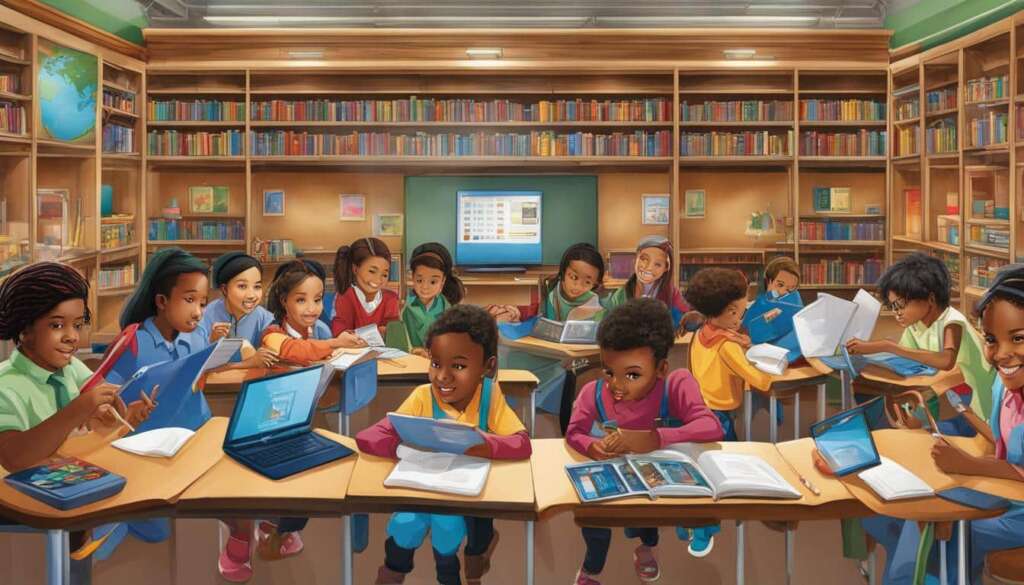Table of Contents
The K12 education system encompasses both primary and secondary schooling and serves as a foundation for a child’s academic and personal growth. It is a comprehensive educational framework that aims to provide students with a well-rounded education and opportunities for specialized learning.
Primary schooling in the K12 system focuses on building a solid foundation of basic skills, such as reading, writing, and mathematics, while secondary schooling offers specialized subjects where students can explore their interests and career goals.
Key Takeaways
- The K12 education system encompasses both primary and secondary schooling.
- Primary schooling emphasizes foundational skills, while secondary schooling offers specialized subjects.
- The K12 system aims to provide a comprehensive education and opportunities for individualized learning.
- Adapting to evolving needs and ensuring equal access to quality education are some of the challenges facing the K12 system.
- The future of K12 education involves integrating technology in the classroom and meeting the demands of a changing world.
The Basics of K12 Education
As one of the cornerstones of the education system, K12 education ensures that students receive a comprehensive education which sets them up for success in later life. The K12 education system spans primary and secondary schooling, providing a framework for learning and development from a young age all the way through to graduation.
The curriculum for K12 education is designed to provide students with a well-rounded education and touches on core skills such as English language, mathematics, science, and social studies. Each subject is taught keeping in line with the academic learning standards that are set out for every grade level, with teachers working to ensure that students have a solid foundation of knowledge and understanding before moving on to more advanced concepts.
Students can expect to cover a wide range of subjects throughout their K12 education, with many schools offering opportunities to broaden their education through elective courses and specialized classes. This means that students have access to a personalized and individualized learning experience which caters to their unique interests and talents.
“At its core, K12 education provides students with a foundation of knowledge and skills that sets them up to reach their full potential.”
Primary Schooling in the K12 System
In the K12 education system, primary schooling years are crucial for laying the foundation for a child’s future academic growth. Early education plays a vital role in providing children with foundational skills that will enable them to achieve academic success later in life.
During these formative years, children learn basic mathematical concepts, reading, and writing skills. They also acquire valuable social and emotional skills that will help them navigate their personal and professional lives. The development of these skills is critical as they form the basis of the child’s educational growth.
Importance of Early Education
Research indicates that early education is critical in shaping a child’s academic and professional outcomes. Children who receive a strong early education foundation are more likely to complete their high school education and pursue higher education. Additionally, they tend to be more successful in their careers and earn higher salaries.
Early education also supports the development of vital cognitive and social skills. It facilitates language acquisition, enhances communication skills, and helps children understand and express their emotions.
Foundational Skills Developed During Primary Schooling
Primary schooling in the K12 system is primarily focused on teaching children the foundational skills required for academic success. These skills include:
- Reading: Learning to read and comprehend texts is a fundamental aspect of primary schooling. Children learn phonics and sight words to enhance their reading abilities.
- Writing: Developing writing skills is critical for communication and personal expression. Children learn how to form letters and words, construct sentences, and express their thoughts coherently through writing.
- Mathematical Concepts: Basic mathematical concepts such as number recognition and arithmetic are introduced during primary schooling. These concepts provide children with a strong foundation for more advanced mathematical education later on.
Other skills, such as problem-solving, critical thinking, and creativity, are also developed during primary schooling. These skills are essential for success in all aspects of life, including academics, personal relationships, and careers.
Secondary Schooling in the K12 System
After completing primary schooling, students enter the secondary stage of K12 education. In this stage, which typically lasts for five to six years, students are exposed to a broader range of subjects and opportunities for personal growth.
The hallmark of secondary schooling is attending high school, which offers students the chance to focus on specialized subjects aligned with their interests and career aspirations. High school students usually have more control over their schedules and choices of subjects. They can choose from a range of subjects, including core subjects such as mathematics, English, science and social studies, as well as specialized subjects such as foreign languages, arts, and vocational education.
High schools often offer extracurricular activities such as sports teams, clubs, and community service programs to engage students in other areas of interests. These activities emphasize teamwork, leadership, and community involvement and provide invaluable opportunities for students’ personal and social development.
High school also provides opportunities for students to pursue advanced coursework such as Advanced Placement courses, which give students the chance to earn college credits while still in high school. Advanced coursework is designed to challenge students intellectually and academically and prepare them for higher education or future careers.
The Importance of Specialized Subjects in High School
In high school, students have the opportunity to focus on specialized subjects aligned with their interests and career goals. Specialized subjects can provide students with the skills and knowledge necessary to succeed in a particular field. For example, students interested in pursuing careers in medicine can focus on advanced science courses, while students interested in pursuing careers in the arts can take specialized courses such as instrumental music, dance, or theater.
As students gain knowledge and skills in specialized subjects during high school, they become better equipped to make informed decisions about their future careers.
The Role of Technology in High School Education
Technology has become an integral part of education, and high schools are no exception. High schools use technological resources to facilitate learning and engage students in different ways. Technology can personalize learning by adapting content and pacing to students’ individual needs and abilities, providing personalized feedback, and offering access to alternative resources.
High schools also use technology to foster collaboration and communication among students and teachers. For example, students can use communication software to collaborate on projects and assignments, and teachers can provide feedback on assignments in real-time.
“High school is a time for exploring different subjects and cultivating a diverse set of skills and knowledge. It’s also a time for personal growth and discovering one’s interests and passions.”
Benefits and Challenges of K12 Education
The K12 education system offers many benefits, providing students with a comprehensive education that prepares them for their future. One of the main advantages of this system is its ability to offer a well-rounded education that covers a wide range of subjects such as English, mathematics, science, and social studies. This variety not only helps students to become more knowledgeable, but it also helps them to explore their interests and strengths.
Another benefit of K12 education is the opportunity for individualized learning. Every student has unique skills, needs, and preferences. K12 education recognizes this fact and allows for personalized learning programs that cater to each student’s needs. Students can receive one-on-one attention from teachers, participate in small group work, and work at their own pace.
However, there are challenges that the K12 education system faces. Providing equal access to quality education for all students can be difficult. Depending on the location, some students may have limited resources or funding, leading to a lack of academic support. Additionally, not all students learn in the same way, and some may require more attention than others. Thus, creating effective learning environments that accommodate diverse learning styles can be a challenge.
“The individualized programs in K12 education cater to each child’s educational needs”
The Importance of Individualized Learning Plans
Individualized learning programs are essential in the K12 education system. These programs provide students with access to an education that meets their individual needs. Moreover, they help students to achieve academic success and build self-esteem. Students who receive personalized attention from teachers are more likely to succeed academically and have a greater sense of belonging in their school community.
The Benefits of Extracurricular Activities
Another essential aspect of the K12 education system is extracurricular activities. These activities provide students with opportunities to explore their interests, develop social skills, and build leadership skills. Extracurricular activities can include sports, music, drama, clubs, and more. Participating in these activities not only enhances students’ experiences, but it also helps build well-rounded individuals with balanced lifestyles.
Overall, the K12 education system offers numerous benefits for students. However, it also faces challenges that must be addressed. By providing individualized learning programs and opportunities for extracurricular activities, we can create an inclusive and effective educational system that prepares students for their future.
The Future of K12 Education
K12 education is in a constant state of evolution, with educators and policymakers working to meet the evolving needs of students in a changing world. One significant area of change is the integration of technology in the classroom, which has the potential to revolutionise the way students learn and teachers teach. However, effective use of technology integration in the classroom requires careful planning, training and investment in devices and materials.
In recent years, the COVID-19 pandemic has highlighted the importance of technology in education. As schools shifted to online learning in response to the pandemic, educators found innovative ways to keep students engaged, such as working with online tools and using video conferencing for remote classes. Even as schools reopen fully, it is expected that elements of online learning will remain a staple due to its effectiveness and convenience.
To meet the evolving needs of students in the future, K12 education must also adapt to accommodate individual learning styles and strengths. This approach, known as personalised learning, offers students the opportunity to engage with the content in a way that suits their unique strengths and interests. The K12 education system must continue to evolve to meet these evolving needs and provide students with personalised learning experiences.
“The future of K12 education is about integrating technology in a way that enhances learning. It’s about understanding each student’s unique needs and empowering them to learn in a way that suits them best. This means providing personalised learning environments that cater to individual needs and strengths.” – Jane Smith, Professor of Education
Meeting the Evolving Needs of Students
As the world continues to change at a rapid pace, the K12 education system must continue to adapt to meet the needs of students. This means going beyond traditional teaching methods and integrating innovative practices that engage students and make learning more relevant to them. By doing so, K12 education can prepare the next generation of students to succeed in a dynamic and ever-changing world.
Conclusion
In conclusion, the K12 education system plays a vital role in providing students with a comprehensive education from primary to secondary schooling. It is a framework that encompasses both early education, which lays the foundation for future academic growth, and high school, which offers opportunities for specialized subjects based on individual interests and career goals.
By understanding its basics, such as curriculum and learning standards, as well as the benefits and challenges the system faces, we can work towards creating an inclusive and effective educational system for all students. Ensuring equal access to quality education for all students is crucial, and the K12 system must evolve to meet the demands of a changing world.
As we look to the future of K12 education, we must consider the integration of technology in the classroom and how the system can adapt to the evolving needs of students. It is only by continuously striving to improve the system that we can provide our future generations with the essential skills and knowledge they need to succeed in life.
FAQ
What is the K12 education system?
The K12 education system is a framework that encompasses both primary and secondary schooling.
What are the basics of K12 education?
K12 education includes a curriculum based on learning standards. Core subjects such as English, mathematics, science, and social studies are taught to provide a well-rounded education.
What is primary schooling in the K12 system?
Primary schooling refers to the early education years within the K12 system. It focuses on foundational skills like reading, writing, and basic mathematical concepts.
What is secondary schooling in the K12 system?
Secondary schooling is the stage of education beyond primary school. In high school, students have the opportunity to delve deeper into specialized subjects based on their interests and career goals.
What are the benefits and challenges of K12 education?
The K12 system offers benefits such as a well-rounded education and opportunities for individualized learning. However, challenges may arise in ensuring equal access to quality education for all students.
What is the future of K12 education?
The future of K12 education includes the integration of technology in the classroom and adapting to the evolving needs of students. The system is continually evolving to meet the demands of a changing world.













